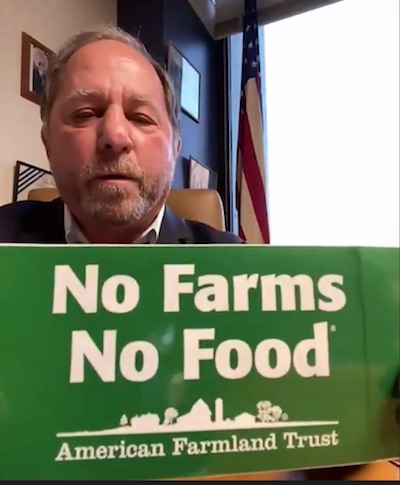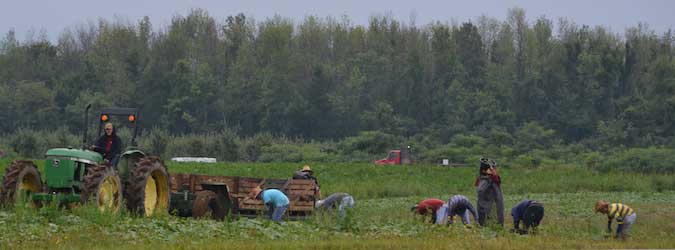Hawley testifies that lowering OT threshold threatens existence of family farms in NY

This screen shot shows Assemblyman Steve Hawley holding a “No Farms No Food” bumper sticker at the close of his testimony last week during a virtual hearing about lowering the overtime threshold for farms below the current 60-hour threshold in a week.
Farms in New York State are again facing the prospect that the overtime threshold will be changed.
There wasn’t an OT threshold until 2020, when it was set at 60 hours a week. Some state legislators are pushing to reduce that to 40 hours a week, like many other industries, but the farming sector has said that will likely put many of the operations out of business, or force them to switch from labor-intensive fruits, vegetables and dairy.
“Their very existence is jeopardized unlike ever before,” Assemblyman Steve Hawley said during the first of three virtual hearings about lowering the OT threshold.
Hawley is a former cash crop and livestock farmer in Batavia. He was the Genesee County Farm Bureau president. A back injury forced him to go into the insurance business where he continues to work with many farmers.
He said many pushing for lowering the overtime threshold have good intentions, but miss the reality that the change will result in smaller paychecks for workers, who will likely pursue farm jobs in other states where they can make more money.
“The surrounding states do not have this restriction,” Hawley said. “The workers will leave for other states where can get more hours.”
Hawley testified during the hearing on Jan. 4. The next two hearings are 5 p.m. on Jan. 18 and 5 p.m. on Jan. 20. (Click here for more information.)
New York farms work on a short growing season, compared to competitors in California and other warmer states. New York farms need to put in long days due to a compressed growing season and that often means working well beyond 40 hours a week, Hawley said.
“Farms cannot operate on a less than 60-hour work week, and the failure to recognize that fact will lead to the loss of our beloved family farms and all the jobs they provide,” Hawley said.
He praised the agriculture community, where he said “less than 1 percent of our population feeds our state, our country and our world.”
Farmers can’t set their prices for what they receive, but face rising costs for fuel, fertilizer and supplies.
“They are at the mercy of the weather and their government,” Hawley said.
A three-person Farm Labor Wage Board is convening the hearings. The group includes David Fisher, President of the New York Farm Bureau; Denis Hughes, former President of the New York State AFL-CIO; and Brenda McDuffie, President of the Buffalo Urban League.
The Wage Board about a year ago on Dec. 31, 2020 voted 2-1 to keep the OT threshold at 60 hours.
Hughes of the AFL-CIO cast the lone nay vote that day. He wanted an eight-year phase-in to 40 hours. In that scenario, Hughes said the OT threshold would be reduced by 2.5 hours each year over eight years until it was at 40 hours a week.
Fisher of the NYFB a year ago advocated for waiting at least three to five years to consider lowering the threshold, so more data could be analyzed on the impact for farms and the workers. Farmers have said in hearings there could be unintended consequences where workers get paid less per week with the overtime threshold dropping because farms could be force to cut hours.
McDuffie of the Urban League about a year ago said there was too much uncertainty in the farm economy to commit to lowering the overtime threshold. She said then farmers have had their markets disrupted by the Covid-19 pandemic. There is no certainty when the Covid impact will end, she said.

Photo by Tom Rivers: Farmworkers harvest vegetables in August 2019 by Townline Road in Barre.































































